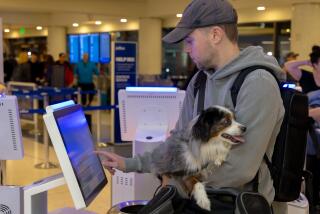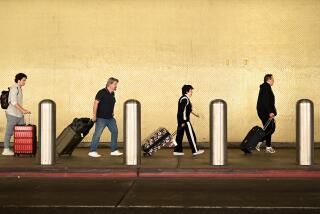Don’t let holiday trips ruffle your feathers
Nearly 36 million Americans are expected to travel 50 miles or more from home during the Thanksgiving holiday this year, according to the latest projections from the American Automobile Assn. That’s an increase of 2% from last year. Air travel alone will climb 6%, the AAA estimates.
If history repeats, you can figure you’ll encounter more than a few crabby seatmates, enraged motorists and maybe even a curt ticket agent or two as you try to get from here to there.
Maintaining a healthy holiday travel mind-set isn’t impossible, experts say, even in the face of post-Sept. 11 security increases, SigAlerts and long lines. Here are their best tips for staying mentally balanced along the way:
“Focus on the breath,” says Shosha Marie Bottoms, a yoga therapist at Angel City Yoga in Studio City. She’s talking not just about taking deep breaths when you find out your flight has been delayed yet again, but about consciously using your breath to practice what she calls “walking meditation,” something you can do at the airport: “Walk, and watch your breath as you walk,” she says. “Focus on the inhalation and exhalation. Concentrate on taking slow, deep breaths.”
Then focus on how you feel when you breathe this way; are you more relaxed?
Rather than turning inward, as in traditional meditation, she suggests observing those around you. As you walk your way through the masses, it helps to repeat something comforting. “At this time of year,” she says, “I choose ‘Peace on Earth and peace in my heart.’ ”
Change your attitude about being on a plane and you’ll automatically change your state of mind, says Dr. Deepak Chopra, the mind-body medicine pioneer and bestselling author. “For me, being on a plane is an opportunity to get away from stress,” says Chopra, who logs several million air miles annually. “My mind-set is, ‘I’m traveling. I can be disengaged from what I do all the time.’ ”
Look on a long flight as an opportunity “to maintain some silence in your mind, to solve a problem that’s been bugging you, to read a really good book or do some journaling,” he suggests. At this time of year you might make a list of what your priorities will be for the new year, he adds.
For a crash course on meditation, see “The Relaxation Response” (Quill, 2000) by Herbert Benson, M.D., a revised paperback edition of the original, published in 1975. Journaling how-to books are plentiful, including “The Complete Idiot’s Guide to Journaling” (Alpha Books, 2000) by Joan R. Neubauer and Kathleen Adams, and “Journaling From the Heart” (Whole Heart Publications, 2000) by Eldonna Bouton.
Chopra takes his own advice about turning a long flight into an opportunity. During a 36-hour trip from Southern California to Australia and then Singapore that was plagued by delays, he decided to make good use of the time. He handwrote the manuscript for “The Seven Spiritual Laws of Success: A Practical Guide to the Fulfillment of Your Dreams,” his 1995 bestselling book.
Before the trip he had given a lecture on the topic, and an audience member had approached him afterward to ask him to turn the information into a book. So he wrote the entire manuscript, which would become a 111-page volume, on the plane. “In Singapore I locked myself in a phone booth and dictated it to my voicemail,” he says.
Being realistic about travel, as simplistic as that might sound, can improve your mental state, says Robert Maurer, a psychologist on staff at Santa Monica-UCLA Medical Center. He notes that the words “travel” and “travail” share some common origins.
“Lower your expectations,” he tells holiday travelers. The notions that travel should be easy, that planes should be on time and that traffic should flow should all go out the door, he says.
“People who do best in holiday situations [with crowds and delays] are the ones who say, ‘We knew it would be like this. It’s just part of the trip,’ ” agrees Harriet Braiker, a psychologist in Los Angeles and Pasadena. The problems occur, she says, when you don’t prepare for the reality of holiday travel. “That’s what tends to flip you out.”
What can keep you patient? “Try to remind yourself of when you did lose it in the past ... and how much better you are doing this time,” she suggests.
You can also shift your attitude about what constitutes the vacation or pleasure part of the trip, Maurer contends. Rather than thinking that getting there is the awful part, “decide that the trip portion is the beginning of your journey, and make it a point to make it fun. Decide that the vacation starts the minute you leave home, whether you are stuck in line or on a plane going nowhere.” If you are going with a loved one, this becomes easier. “The very reason for the travel is not the destination but [being with] the travel companion,” Maurer says.
That advice could apply just as well to motorists as to airline passengers.
Scott Ellison, a public affairs spokesman for the California Highway Patrol who is also a traffic officer, thinks drivers’ mental state would be healthier if they went with the flow and focused not only on road conditions but also on the comfort of their fellow passengers. “If there’s heavy traffic, take a two-hour dinner,” he suggests. Take more breaks, plan your route carefully and “try to leave when the traffic is not heavy.” If you do all that, you’re bound to be less aggravated, he says, and a safer, saner traveler.
Adopting the attitude of Robert Louis Stevenson couldn’t hurt, either. “For my part,” he said, “I travel not to go anywhere, but to go. I travel for travel’s sake. The great affair is to move.”
*
Healthy Traveler appears twice a month. Kathleen Doheny can be reached at [email protected].
More to Read
Sign up for The Wild
We’ll help you find the best places to hike, bike and run, as well as the perfect silent spots for meditation and yoga.
You may occasionally receive promotional content from the Los Angeles Times.






